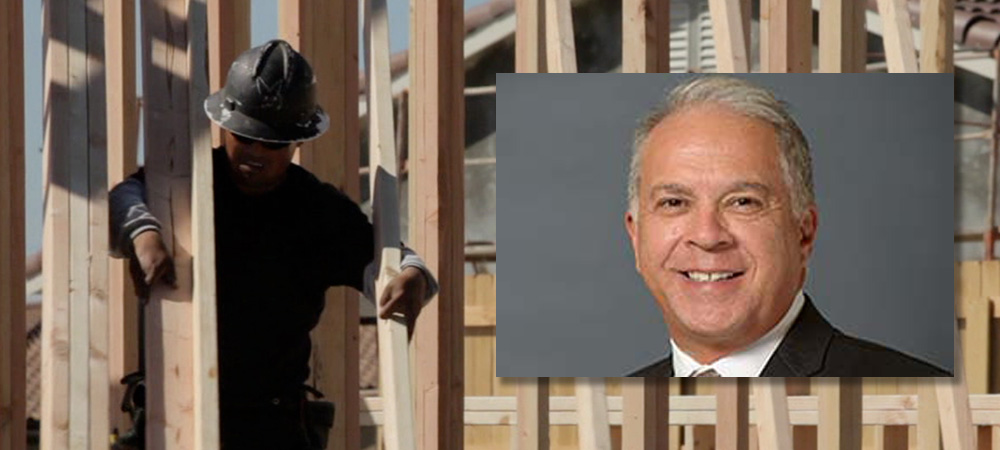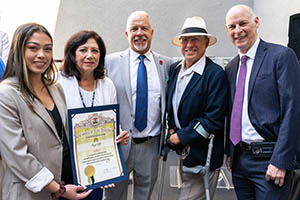
California Forward is committed to advancing policy intersections that create a more inclusive and sustainable California where all people can prosper. The Voices of Shared Prosperity series amplifies the stories of Californians who are committing their time and talent to solutions that embrace equity, environmental sustainability, and economic opportunity.
When Cesar Chavez founded the United Farm Workers in 1962, his vision included better working conditions and stronger communities where farmworkers and their families could thrive.
One piece of that puzzle was affordable housing. In 1973, the Cesar Chavez Foundation (then named the National Farmworkers Service Center) created its first affordable housing project for elderly and displaced Filipino American farmworkers in Delano. The project was just the beginning of the Foundation’s efforts to create affordable housing for farmworkers and their families in the Central Valley.
Today, the Cesar Chavez Foundation is greatly expanded and builds affordable housing projects in four states (California, Arizona, New Mexico and Texas) under the leadership of Alfredo Izmajtovich, executive vice president of the Foundation’s Housing and Economic Development Fund.
“Affordable housing is really challenging. There’s a lot of layers in government programs, but the other thing is the tangible results of your work,” said Izmajtovich. “When you’re done and you see the product and you see the people who move in and how happy they are and the impact you’re making on people’s lives, that’s a pretty great feeling.”
Izmajtovich grew up in the Los Angeles area and received his undergraduate and MBA degrees from UCLA. He’s worked for non-profit and for-profit housing developers as well as for the Community Development Commission for Los Angeles County.
One of the issues he sees is that rising housing costs have not only impacted those with low-income but spread to middle-income earners as well. “I think the current infrastructure of affordable housing is really to help the lowest income,” he explained. “There is nothing in the space from 60% to 150% EMI (equated monthly installment), there is, but it’s so miniscule.”
According to CA FWD’s California Dream Index, less than 50% of rental households are paying less than 30% of their income on rent, showing that rent is unaffordable for more than half of California’s renters.
As a self-described “deal-junkie” who likes to solve problems, he is tackling this issue. “I think the focus policy-wise is how do we get that middle-income sector going and whether or not there are ways for us to do an inclusionary incentive for for-profit groups. That segment is much bigger than the non-profit sector, which could allow for substantial numbers of new affordable units.”
One solution is to offer a density bonus of 15% in exchange for 5% affordable units with no subsidy. That would mean 10 affordable, middle-income range units in a 200-unit development. “And they pay for it because the market-rate rents are covering the costs of the project,” Izmajtovich explained. “That adds up after a while. Those 10 units — if you do that across every deal that’s getting done in the state, now you’re starting to make some numbers.”
He sees the need for collaboration with for-profit, market-rate developers because the need for affordable housing is so great. “Unfortunately, we’re a drop in the bucket, as they say. The amount of work that needs to be done is like a hundred times more than what the current capacity is of the non-profit community in California.”

Even against those odds, the Chavez Foundation is making progress with multiple projects in the four states and some targeting specific communities. “We just finished one phase of a project called Plaza Ortiz in El Monte (California) that serves veterans and families.” Phase II of that project will serve families fleeing domestic violence. He added, “It shows that we’re doing the family housing that we want to do, which is the most needed, but we’re also supporting specialized populations that also need support.”
From the early housing projects in Delano, Fresno and Parlier to the current projects in downtown Los Angeles, Austin, Texas and Glendale, Arizona, the Chavez Foundation continues its commitment to build stronger communities for workers and their families.
“I think we’re trying to be a developer who can be successful in all places – rural communities, suburban communities, urban communities. We want to be able to help all of them, so that’s our goal,” said Izmajtovich.
Housing and Home Ownership will be one of the topics discussed at the California Economic Summit in Bakersfield on October 27-28. Additionally, the National Chavez Center is one of the Summit’s Regional Tour options taking place before the Summit on October 26. Click here to learn more about the Summit and register today.

